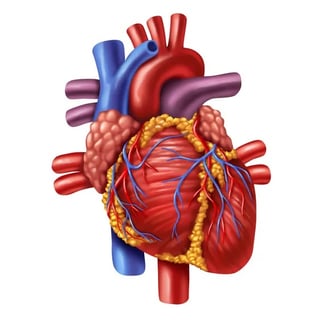

The human heart is a vital organ responsible for pumping blood throughout the body. It functions as part of the circulatory system, ensuring that oxygen, nutrients, and waste products are transported to and from cells, tissues, and organs. It beats around 100,000 times per day, making it one of the hardest-working muscles in the body.
The heart is a fist-sized organ located in the thoracic cavity, responsible for pumping blood and supplying oxygen and nutrients. It has four chambers, four valves, and blood vessels, with a normal heartbeat of 60-100 beats per minute (bpm). Essential for life, it regulates blood pressure and maintains cardiac output. Here's an overview of its anatomy:
